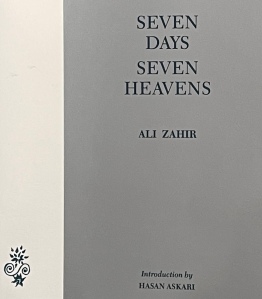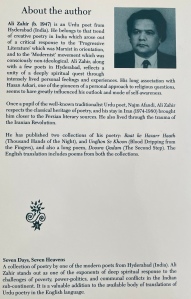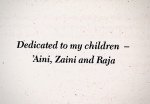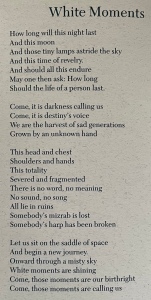 Dr. Rowan Williams, Archbishop of Canterbury (2002-2012), is currently Master of Magdalene College, University of Cambridge. Dr. Williams is a highly respected scholar, theologian, poet, translator, social commentator to name but a few of the reasons why he is held in such great regard.
Dr. Rowan Williams, Archbishop of Canterbury (2002-2012), is currently Master of Magdalene College, University of Cambridge. Dr. Williams is a highly respected scholar, theologian, poet, translator, social commentator to name but a few of the reasons why he is held in such great regard.
Sincere thanks to Dr. Rowan Williams for agreeing to this interview.
SPIRITUAL HUMAN INTERVIEW WITH DR. ROWAN WILLIAMS
Musa Askari: I would like to begin with a quote from your book “Faith in the Public Square” (section: Religious Diversity and Social Unity), “To be concerned about truth is at least to recognise that there are things about humanity and the world that cannot be destroyed by oppression and injustice, which no power can dismantle. The cost of giving up talking of truth is high: it means admitting that power has the last word. And ever since Plato’s Republic political thinkers have sought to avoid this conclusion, because it means there is no significance at all in the witness of someone who stands against the powers that prevail at any given time.” (Dr. Rowan Williams)
The following a quote from my late father, Professor Syed Hasan Askari, on “The Platonic Illusion“: “the directors of the October Revolution suffered from what we call the Platonic Illusion from which all ideologies, whether religious or secular have suffered, namely to create a protective state to guard what they hold as true. Plato had thought as he watched his dear Socrates being put to death, by the City of Athens, that by creating a Republic he would protect the free quest for truth, a state governed by the wise and the enlightened, under which no other Socrates would be silenced. Plato failed to notice that by the manner Socrates accepted his death he had showed how he regarded himself and his soul as indestructible, that he did not require any other means than of himself and his awareness in order to protect what he stood for.”
How significant do you sense it is for the individual, the individual witness, to avoid losing one’s individuality? In other words keeping intact an inner differentiation, guarding against collective hypnosis. Also to what extent would you agree it is problematic when those in power seek to institutionalise or “create a protective state to guard what they hold as true”?
Rowan Williams: Keeping an inner freedom is essential. We need to be aware of who it is or what it is that we are truly answerable to, rather than assuming that our final judges are those who happen to have power and influence in our immediate context. It must always be possible to ask, ‘is the majority right?’ And this is why a genuine democracy protects freedom of conviction and expression; it will encourage robust public debate and give a place to religious conviction as part of that. It will of course make decisions, but will also leave room for conscientious dissent.
Musa Askari: I would like to offer you two views on the term “spiritual” and invite your comment.
First from my interview with Professor Noam Chomsky. In an interview for The Humanist in 2007 Professor Chomsky is quoted, “When people say do you believe in God? what do they mean by it? Do I believe in some spiritual force in the world? In a way, yes. People have thoughts, emotions. If you want to call that a spiritual force, okay. But unless there’s some clarification of what we’re supposed to believe in or disbelieve in, I can’t”.
Second from my interview with Professor Tim Winter / Abdal Hakim Murad who commences his comments with, “The meaning of the category of the ‘spiritual’ has been so heavily debased by vague New Age appropriations that, although I have sometimes used it myself as a kind of shorthand, I usually find it useless. So many people tell me that they are ‘spiritual but not religious’; but have nothing to say when asked what this means, other than offering a woolly, half-finished sentence which indicates that they have experienced an emotional high in certain situations.”
What does the term “spiritual” mean to you and I would be grateful if you would offer some clarification which Professor Chomsky talks about? And is it unusual in your experience for both humanist and believer to share what appears to be a similar perspective on the term “spiritual”?
 Rowan Williams: I rather share Tim Winter’s doubts about the word ‘spiritual’, as it is so often used simply to designate someone’s feeling of a moment’s significance without posing any questions about the nature of reality or the possibilities of change in society. I understand the word very much against the background of a Christian scriptural use which sees ‘spirit’ as that which connects us to God and one another, that which gives us relation with God and the possibility of life together in peace and justice. Hence the Christian scriptural imagery of the ‘fruits of the spirit’ – the products of God’s indwelling seen as love, joy, peace, patience and so on. To Professor Chomsky’s remarks, I’d respond by saying that the essence of belief in God as I understand it is not belief in values or imperatives but in the actual (though mysterious) presence of an immeasurable agency whose action is directed towards our life and well-being. Such a belief gives me not only assurance but also a sense of being under judgement for my failures to reflect that utterly generous orientation to the Other in my own life and actions.
Rowan Williams: I rather share Tim Winter’s doubts about the word ‘spiritual’, as it is so often used simply to designate someone’s feeling of a moment’s significance without posing any questions about the nature of reality or the possibilities of change in society. I understand the word very much against the background of a Christian scriptural use which sees ‘spirit’ as that which connects us to God and one another, that which gives us relation with God and the possibility of life together in peace and justice. Hence the Christian scriptural imagery of the ‘fruits of the spirit’ – the products of God’s indwelling seen as love, joy, peace, patience and so on. To Professor Chomsky’s remarks, I’d respond by saying that the essence of belief in God as I understand it is not belief in values or imperatives but in the actual (though mysterious) presence of an immeasurable agency whose action is directed towards our life and well-being. Such a belief gives me not only assurance but also a sense of being under judgement for my failures to reflect that utterly generous orientation to the Other in my own life and actions.
Musa Askari: “This is not a journey for the feet; the feet bring us only from land to land; nor need you think of coach or ship to carry you away; all this order of things you must set aside and refuse to see: you must close the eyes and call instead upon another vision which is to be waked within you, a vision, the birthright of all, which few turn to see.” (Plotinus – The Enneads)
These words from the great mystic-philosopher Plotinus, introduced to me by my late father-teacher, have long been, along with other things, a cherished part of my spiritual life. Yet perhaps within the inner life of a believer there needs to be awareness of a kind of spiritual complacency. Would you agree to simply memorise a set of words, a prayer perhaps, or even a whole scripture, or the universal declaration of human rights appears to be not enough? How would you advise we guard against at times the familiarity of words we utter from becoming a mask over the reality of what the words are but a signpost toward, “a journey not for the feet”?
Rowan Williams: Plotinus’s words are echoed by those of the great Christian thinker Augustine (who knew Plotinus’s work) when he says that God is ‘more intimate to us than we to ourselves’. God is always nearer than we could imagine. Sometimes we need familiar words to use to remind ourselves of this – I think here of the prayerful recitation of the Names of God or the invocation of the Name of Jesus. If we are careful to punctuate our thinking and speaking with silence, words will begin to recover their original depth. We need always to be aware of our words as ‘nets let down to catch the sea.’
Musa Askari: On universal validity of mystical experience Professor Syed Hasan Askari writes, “There are some who question the universal validity of mystical experience as an expression of one universal ultimate reality. But we do not normally question the universal presence of life, beauty and love which inspire diverse forms of art, music, song and poetry. Nor do we normally question the universal presence of intellect which is the common foundation of different and conflicting theories of science and philosophy. But why is it that as soon as we refer to the universal validity of mystical experience people leap upon us from all sides insisting that mystical experience is subjective experience determined by one’s culture, theology, and personal psychological history. In every other case they seem to remain unperturbed by the co-presence of the objective and the subjective, the universal and the particular – as, for example, in regard to the human body, where there is one objective science of human anatomy and physiology upon which the entirety of medical science is based, and yet there are individual variations as to the state of health and nature of sickness. It is obvious then that the tendency to object to mystical experience’s claim of its inherent universal validity is influenced by a bias that if it is conceded, the next step would be to admit that there is a universally objective source of religious revelations. The objection is motivated by unphilosophical reasons. But it does not mean, however, that all mystical experiences are valid, and that there are no influences from the subject’s milieu and psychic constitution towards the experienced mystical state.”
I would be grateful if you could share your thoughts in response to the above quote on “mystical experience”. How has your inner life been influenced by the presence of more than one religious witness in the world? Is it easier to encounter the other socio-religiously, almost inevitable, even involuntary given the instant nature of global communications? However, to encounter our spiritual neighbour perhaps involves invoking another kinship. One laid out for example in the great mystical challenge of the Sermon on the Mount. Therefore, how do we recognise each other as not only culturally-religiously co-present, upholding all the wondrous diversity, but also spiritually mystically deeply significant to one another, transformative?
Rowan Williams: The idea of universal recognition is crucial here: we see in one another something of the same desire, the same journey, the same drawing onwards – and if we truly believe that our humanity is one at the end of the day, then this is hardly surprising. So I don’t find difficulty in learning from the spiritual explorations of those who do not share my exact convictions. Of course my prayer and understanding depend to a degree on where and who I am and what specific beliefs I hold; I’m not in favour of any attempt to construct a universal system above and beyond the particular religious traditions. But I also think that the more securely you are rooted in your own tradition, the more hospitable you will be to the deepest life in other places. You will see the other, in their otherness, as a gift to you for your growth and maturation.
Musa Askari: I would like to turn now to issues with respect to revelatory communication, the scientific age and quest for alternatives. First, some context by way of the following selection of quotes from Professor Syed Hasan Askari (Discourse on Soul, from Towards A Spiritual Humanism, 1991).
“Let us begin with those people who went through a cataclysmic experience which altered their own self-understanding and which they identified as revelation, as an experience transcending their empirical or functional self. For them, and also for those who said “Yes” to that experience and who entered in to discipleship with such people, and for those who were more reflective in their understanding, the central question was: how could the human mind or the human self become a receptacle, or a vehicle or recipient of an experience, of a revelation, of a transcendental communication – unless, between the source of communication and the recipient there is a common link. Unless there is such an ontological parity between one who communicates and one who receives, the communication will not be obtainable…….It is this problem which was at the heart of the controversy between philosophers and theologians. Izutsu, the Japanese philosopher and an expert in the semantic analysis of the Qur’an, suggests in his analysis of the Quranic discourse that unless there is an ontological parity between the two partners in communication, communication is impossible…….whether you take St. Augustine or Immanuel Kant, you have the same thrust, the same emphasis about the mystery of the human recipient…….Taking hints and clues from medieval insights based upon the edifice of knowledge we have accumulated, I am striving to formulate an alternate anthropology, a substantial alternative to Darwin, Marx and Freud. We have to ask if the anthropology we have held as sacred in modern times is the whole truth or is it not already a dogma. A dogma perhaps more dangerous than the dogmatics of the ancients and medieval peoples because, at that time at least, the conflict between theology and philosophy and between theology and mysticism was very sharp. In our times, the dogmatics of a scientific understanding of man has swept across the whole world and there appears to be no rival to it. Moreover, whoever tries to rival it is considered as either pseudo-scientific or not to be taken seriously at all. Heretics in the past enjoyed a certain prestige, and they became in posterity the great pioneers of human thought. Does the scientific age of our times allow our heretics to become future founders of thought? I am doubtful.” (Syed Hasan Askari)
I welcome your thoughts in reply to the above quotes. In particular do you support revival of the classical discourse on soul as a means to help explain not only revelatory communication between the Supremely meta-physical (Beyond Being, The One/The Good as Plotinus refers) and the material aspect of a human being but also communication between individuals in our everyday lives? That the principle of “Soul” (non-material, indivisible, invisible companion, one-many all at once) is the ontological parity. And finally what do you see as the great opportunities before us for meaningful, mutually respectful, engagement/dialogue between religion/spirituality and humanism? Can we start to talk about what Hasan Askari advocated, a move towards a Spiritual Humanism?
Rowan Williams: Hasan Askari is absolutely correct in saying that a proper account of our relation with the Infinite God requires us to see ourselves differently. The Christian teacher Gregory of Nyssa in the fourth century CE says that if we understand that we cannot ever come to the end of understanding God, neither can we come to an end of understanding the human person. So we must always approach the human person with absolute reverence – this human individual is a reality we shall never completely contain, control, explain, reduce, and so we have an endless task before us, which is loving and serving them, not explaining them! And for religious believers, there is therefore a close connection between recognizing the infinite mystery of God and reverencing humanity properly. Lose the one and you will sooner or later lose the other. Humanism in the fullest sense requires an acknowledgement of God. A ‘soulless’ humanity, understood simply in terms of mechanical processes, does not have any obvious claim on our kindness, our service, our veneration. We may not be able to say with complete clarity what we mean by the word ‘soul’, but we know that it stands for our capacity to be in relation with God, and thus for all that belongs with our freedom and dignity.
(Many thanks to Dr. Rowan Williams for his kind permission on use of above photo)














